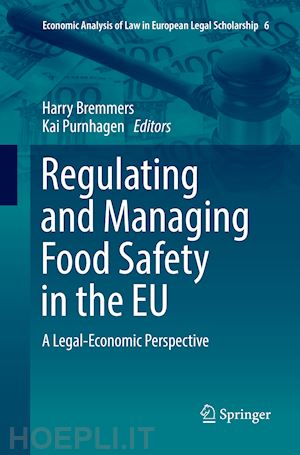
Questo prodotto usufruisce delle SPEDIZIONI GRATIS
selezionando l'opzione Corriere Veloce in fase di ordine.
Pagabile anche con Carta della cultura giovani e del merito, 18App Bonus Cultura e Carta del Docente
This book analyses EU food law from a regulatory, economic and managerial perspective. It presents an economic assessment of strategies of food safety regulation, and discusses the different regulatory regimes in EU food law. It examines the challenges of food safety in the internal market as well as the regulatory tools that are available. The book’s generic theorising and measurement of regulatory effects is supplemented by detailed analysis of key topics in food markets, such as health claims, enforcement strategies, and induced risk management at the level of the organizations producing food. The regulatory effects discussed in the book range from classical regulatory analysis covering e.g. effects of ex-ante versus ex-post regulation and content-related versus information-related regulation to new regulatory options such as behavioral regulation. The book takes as its premise the idea that economic considerations are basic to the design and functioning of the European food supply arena, and that economic effects consolidate or induce modification of the present legal structures and principles. The assessments, analyses and examination of the various issues presented in the book serve to answer the question of how economic theory and practice can explain and enhance the shaping and modification of the regulatory framework that fosters safe and sustainable food supply chains.
Regulating and Managing Food Safety in the EU: A Legal-Economic Perspective.- Private Food Safety Standards in the EU.- Investigating the Regulatory Structure of Voluntary Sustainability Standards Foundations for Intervention Strategies to Increase Consumer Confidence.- Environmental Sustainability and the Food System.- EU Health Claims: A Consumer Perspective.- Regulatory Compliance and Company Strategies: The Case of the Nutrition and Health Claims Regulation (EC) No. 1924/2006.- Foods for Specific Consumer Groups.- Commanding to “Nudge” via the Proportionality Principle?.- Obesity, Fat Taxes and their Effects on Consumers.- ‘Substance over form’ – A Principle for European Food Information Regulation? .- European Food Law and the Precautionary Principle – Paradoxical Effects of the EU’s Precautionary Food Policies.- Enforcement of European Food Laws.- The Economics of Harmonization of Food Law in the EU.- Pre-Market Approval and its Impact on Food Innovation – The Novel FoodsExample.- Agricultural Biotechnology: Regulation in the United States and the European Union.
Kai Purnhagen is Associate Professor at Wageningen University and distinguished international visitor at the Erasmus Universityof Rotterdam law school. Previously, he has taught and researched at various institutions including the Ludwig-Maximilian University Munich, the University of Lucerne, the European University Institute, Wageningen University, the London School of Economics and Political Science, the University of Wisconsin-Madison, the Justus-Liebig-University Giessen, and the University of Amsterdam. He holds a PhD (European University Institute in Florence), an LL.M. (University of Wisconsin-Madison), an MJI (Justus-Liebig University of Giessen) and a State Exam in Law (Land Hessen).











Il sito utilizza cookie ed altri strumenti di tracciamento che raccolgono informazioni dal dispositivo dell’utente. Oltre ai cookie tecnici ed analitici aggregati, strettamente necessari per il funzionamento di questo sito web, previo consenso dell’utente possono essere installati cookie di profilazione e marketing e cookie dei social media. Cliccando su “Accetto tutti i cookie” saranno attivate tutte le categorie di cookie. Per accettare solo deterninate categorie di cookie, cliccare invece su “Impostazioni cookie”. Chiudendo il banner o continuando a navigare saranno installati solo cookie tecnici. Per maggiori dettagli, consultare la Cookie Policy.